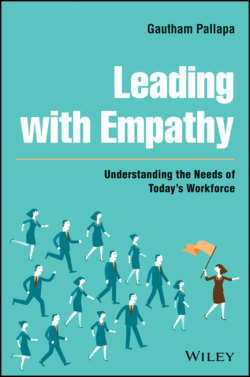Читать книгу Leading with Empathy - Gautham Pallapa - Страница 27
Lead with Empathy
ОглавлениеOverwhelmed, angry, weary, confused, concerned, impatient—these feelings can paralyze organizations and people alike. But it doesn't have to be that way. Why not seize the moment and become the empathic leader that the world needs right now? Why not use this unique opportunity to focus everyone on strengthening our empathy muscles for the good of ourselves, our families, our communities, and our world, while we also proceed to pursue sorely needed systemic changes?
Each of us has a unique personality. That makes us different, but equally we all have lots in common and are connected in so many ways. We live in our own realities that are defined by our senses and our own experiences. But we are social beings and it is of utmost importance to our personal development to experience other people's realities. Our ability to communicate and understand our and other peoples' emotional states are keys to maintaining our relationships. When we observe someone experiencing joy or sadness, we are experiencing a similar sensation to a certain extent. Being empathetic means thinking further beyond ourselves and our own concerns. It shows our ability to put ourselves in another person's position to feel what they are experiencing.
Empathy is a very vital aspect of our daily lives. This is because it enables us to show compassion to other people, relate to our friends, loved ones, colleagues, and even strangers, hence affecting the world positively. As we embrace our role as empathic leaders, we also need to be cognizant of the difference between sympathy and empathy. Sympathy is driven by feelings of pity or concern for another person without really comprehending what it feels like to be in that person's situation. One can feel sympathy for homeless people, someone crying on the street, or painfully hobbling along with crutches on an icy footpath. However, empathy refers to the ability to imagine oneself in another's situation; experience the emotions, ideas, or opinions of that person; and take action to help reduce pain and suffering for the other person.
Empathic leaders are in short supply in the workforce as well. The stereotype of a workforce leader has been military in nature with no leeway for human emotions. This behavior suppresses any dredge of feeling in the workplace, and people are hesitant to demonstrate emotion lest they be judged weak and ineffective. It is imperative that we destroy this leadership stereotype if we want to enable our fellow humans. Genuinely understanding the need of team members, being sensitive to team needs, and selflessly striving to increase psychological safety in the organization are some benefits of an empathetic leadership style.
From a global perspective, empathy is infinitely important particularly if it ends in compassion. Empathy motivates people to step in and help those who have been struck by major disasters even if they are total strangers. Empathy brings out the best in us and improves the global quality of life. When you lead with empathy, you are empowering humanity in the face of adversity.
